Filters
Filters allow you to better scope the index queries for records you are looking for.
Defining filters
Avo has two types of filters available at the moment Boolean filter and Select filter.

Filter values
Because the filters get serialized back and forth, the final value/values in the apply method will be stringified or have the keys stringified if they are hashes. You can declare them as regular hashes (with the keys symbolized) in the options method, but they will get stringified in the end.
Boolean Filter
You generate one running bin/rails generate avo:filter featured_filter, creating a filter configuration file.
class FeaturedFilter < Avo::Filters::BooleanFilter
self.name = 'Featured filter'
# `values` comes as a hash with stringified keys
# Eg:
# {
# 'is_featured': true
# }
def apply(request, query, values)
return query if values['is_featured'] && values['is_unfeatured']
if values['is_featured']
query = query.where(is_featured: true)
elsif values['is_unfeatured']
query = query.where(is_featured: false)
end
query
end
def options
{
is_featured: "Featured",
is_unfeatured: "Unfeatured"
}
end
# Optional method to set the default state.
# def default
# {
# is_featured: true
# }
# end
endEach filter file comes with a name, apply, and options methods.
The name method lets you set the name of the filter.
The apply method is responsible for filtering out the records by giving you access to modify the query object. The apply method also gives you access to the current request object and the passed values. The values object is a Hash containing all the configured options with the option name as the key and true/false as the value.
# Example values payload
{
'is_featured': true,
'is_unfeatured': false,
}The options method defines the available values of your filter. They should return a Hash with the option id as a key and option label as value.
Default value
You can set a default value to the filter, so it has a predetermined state on load. To do that, return the state you desire from the default method.
class FeaturedFilter < Avo::Filters::BooleanFilter
self.name = 'Featured status'
def apply(request, query, values)
return query if values['is_featured'] && values['is_unfeatured']
if values['is_featured']
query = query.where(is_featured: true)
elsif values['is_unfeatured']
query = query.where(is_featured: false)
end
query
end
def options
{
is_featured: "Featured",
is_unfeatured: "Unfeatured"
}
end
def default
{
is_featured: true
}
end
endSelect Filter
Select filters are similar to Boolean ones. For example, you generate one running rails generate avo:filter published_filter --select.
The most significant difference from the Boolean filter is in the apply method. You only get back one value attribute, which represents which entry from the options method is selected.
A finished, select filter might look like this.
class PublishedFilter < Avo::Filters::SelectFilter
self.name = 'Published status'
# `value` comes as a string
# Eg: 'published'
def apply(request, query, value)
case value
when 'published'
query.where.not(published_at: nil)
when 'unpublished'
query.where(published_at: nil)
else
query
end
end
def options
{
published: "Published",
unpublished: "Unpublished"
}
end
# Optional method to set the default state.
# def default
# :published
# end
endDefault value
The select filter supports setting a default too. That should be a string or symbol with the select item. It will be stringified by Avo automatically.
class PublishedFilter < Avo::Filters::SelectFilter
self.name = 'Published status'
def apply(request, query, value)
case value
when 'published'
query.where.not(published_at: nil)
when 'unpublished'
query.where(published_at: nil)
else
query
end
end
def options
{
'published': 'Published',
'unpublished': 'Unpublished',
}
end
def default
:published
end
endMultiple select filter
You may also use a multiple select filter.
class PostStatusFilter < Avo::Filters::MultipleSelectFilter
self.name = "Status"
# `value` comes as an array of strings
# Ex: ['admins', 'non_admins']
def apply(request, query, value)
if value.include? 'admins'
query = query.admins
end
if value.include? 'non_admins'
query = query.non_admins
end
query
end
def options
{
admins: "Admins",
non_admins: "Non admins",
}
end
# Optional method to set the default state.
# def default
# ['admins', 'non_admins']
# end
end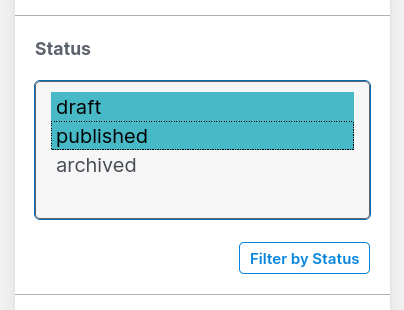
Dynamic options
The select filter can also take dynamic options:
class AuthorFilter < Avo::Filters::SelectFilter
self.name = 'Author'
def apply(request, query, value)
query = query.where(author_id: value) if value.present?
query
end
# Example `applied_filters`
# applied_filters = {
# "CourseCountryFilter" => {
# "USA" => true,
# "Japan" => true,
# "Spain" => false,
# "Thailand" => false,
# }
# }
def options
# Here you have access to the `applied_filters` object too
Author.select(:id, :name).each_with_object({}) { |author, options| options[author.id] = author.name }
end
endText Filter
You can add complex text filters to Avo by running rails generate avo:filter name_filter --text.
class NameFilter < Avo::Filters::TextFilter
self.name = "Name filter"
self.button_label = "Filter by name"
# `value` comes as text
# Eg: 'avo'
def apply(request, query, value)
query.where('LOWER(name) LIKE ?', "%#{value}%")
end
# def default
# 'avo'
# end
endDefault value
You may set default values for the options you set. For example you may set which option to be selected for the select filter and which checkboxes to be set for the boolean filter.
In the default method you have access to the request, params, context, view_context, and current_user objects.
Registering filters
To add a filter to one of your resources, you need to declare it on the resource using the filter method to which you pass the filter class.
class PostResource < Avo::BaseResource
self.title = :name
self.search = :id
field :id, as: :id
# other fields
filter PublishedFilter
endDynamic filter options
Watch the demo videoYou might want to compose more advanced filters, like when you have two filters, one for the country and another for cities, and you'd like to have the cities one populated with cities from the selected country.
Let's take the CourseResource as an example.
# app/models/course.rb
class Course < ApplicationRecord
def self.countries
["USA", "Japan", "Spain", "Thailand"]
end
def self.cities
{
USA: ["New York", "Los Angeles", "San Francisco", "Boston", "Philadelphia"],
Japan: ["Tokyo", "Osaka", "Kyoto", "Hiroshima", "Yokohama", "Nagoya", "Kobe"],
Spain: ["Madrid", "Valencia", "Barcelona"],
Thailand: ["Chiang Mai", "Bangkok", "Phuket"]
}
end
endWe will create two filters—one for choosing countries and another for cities.
# app/avo/resources/course_resource.rb
class CourseResource < Avo::BaseResource
filter CourseCountryFilter
filter CourseCityFilter
endThe country filter is pretty straightforward. Set the query so the country field to be one of the selected countries and the options are the available countries as Hash.
# app/avo/filters/course_country_filter.rb
class CourseCountryFilter < Avo::Filters::BooleanFilter
self.name = "Course country filter"
def apply(request, query, values)
query.where(country: values.select { |country, selected| selected }.keys)
end
def options
Course.countries.map { |country| [country, country] }.to_h
end
endThe cities filter has a few more methods to manage the data better, but the gist is the same. The query makes sure the records have the city value in one of the cities that have been selected.
The options method gets the selected countries from the countries filter (CourseCountryFilter) and formats them to a Hash.
# app/avo/filters/course_city_filter.rb
class CourseCityFilter < Avo::Filters::BooleanFilter
self.name = "Course city filter"
def apply(request, query, values)
query.where(city: values.select { |city, selected| selected }.keys)
end
def options
cities_for_countries countries
end
private
# Get a hash of cities for certain countries
# Example payload:
# countries = ["USA", "Japan"]
def cities_for_countries(countries_array = [])
countries_array
.map do |country|
# Get the cities for this country
Course.cities.stringify_keys[country]
end
.flatten
# Prepare to transform to a Hash
.map { |city| [city, city] }
# Turn to a Hash
.to_h
end
# Get the value of the selected countries
# Example payload:
# applied_filters = {
# "CourseCountryFilter" => {
# "USA" => true,
# "Japan" => true,
# "Spain" => false,
# "Thailand" => false,
# }
# }
def countries
if applied_filters["CourseCountryFilter"].present?
# Fetch the value of the countries filter
applied_filters["CourseCountryFilter"]
# Keep only the ones selected
.select { |country, selected| selected }
# Pluck the name of the coutnry
.keys
else
# Return empty array
[]
end
end
end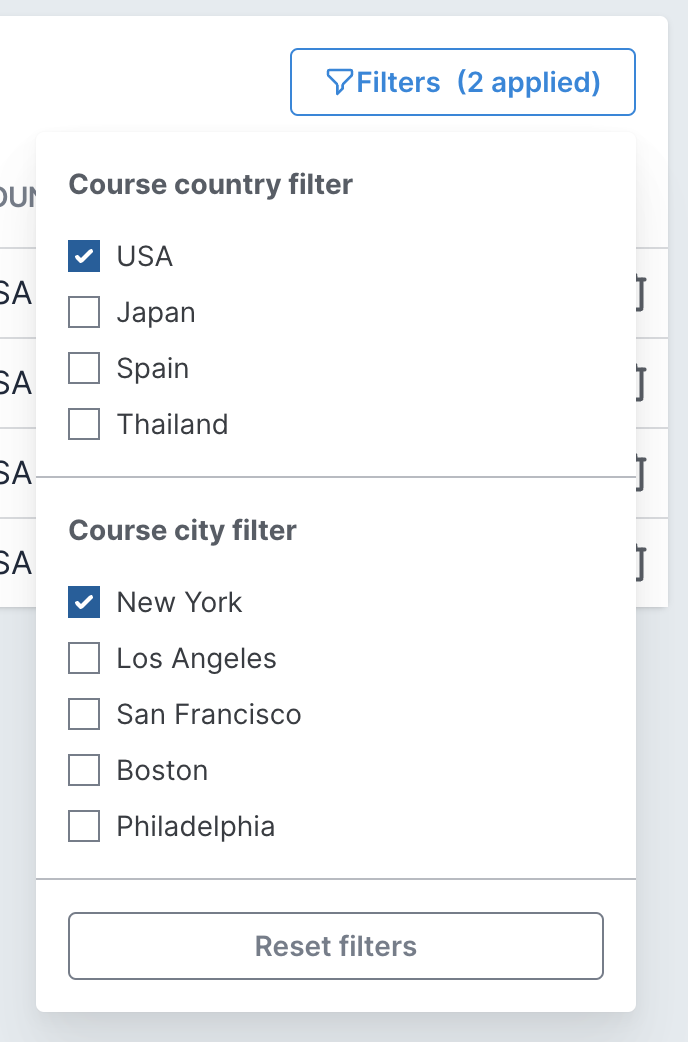
The countries method above will check if the CourseCountryFilter has anything selected. If so, get the names of the chosen ones. This way, you show only the cities from the selected countries and not all of them.
React to filters
Watch the demo videoGoing further with the example above, a filter can react to other filters. For example, let's say that when a user selects USA from the list of countries, you want to display a list of cities from the USA (that's already happening in options), and you'd like to select the first one on the list. You can do that with the react method.
# app/avo/filters/course_city_filter.rb
class CourseCityFilter < Avo::Filters::BooleanFilter
self.name = "Course city filter"
def apply(request, query, values)
query.where(city: values.select { |city, selected| selected }.keys)
end
def options
cities_for_countries countries
end
# applied_filters = {
# "CourseCountryFilter" => {
# "USA" => true,
# "Japan" => true,
# "Spain" => false,
# "Thailand" => false,
# }
# }
def react
# Check if the user selected a country
if applied_filters["CourseCountryFilter"].present? && applied_filters["CourseCityFilter"].blank?
# Get the selected countries, get their cities, and select the first one.
selected_countries = applied_filters["CourseCountryFilter"].select do |name, selected|
selected
end
After all, filters are applied, the react method is called, so you have access to the applied_filters object. Using the applied filter payload, you can return the value of the current filter.
def react
# Check if the user selected a country
if applied_filters["CourseCountryFilter"].present? && applied_filters["CourseCityFilter"].blank?
# Get the selected countries, get their cities, and select the first one.
selected_countries = applied_filters["CourseCountryFilter"]
.select do |name, selected|
selected
end
# Get the first city
cities = cities_for_countries(selected_countries.keys)
first_city = cities.first.first
# Return the first city selected as a Hash
[[first_city, true]].to_h
end
endBesides checking if the countries filter is populated (applied_filters["CourseCountryFilter"].present?), we also want to allow the user to customize the cities filter further, so we need to check if the user has added a value to that filter (applied_filters["CourseCityFilter"].blank?). If these conditions are true, the country filter has a value, and the user hasn't selected any values from the cities filter, we can react to it and set a value as the default one.
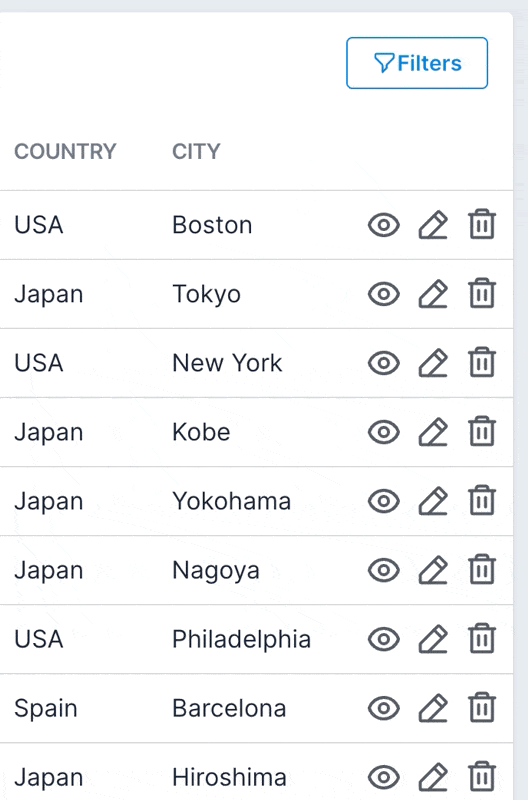
Of course, you can modify the logic and return all kinds of values based on your needs.
Empty message text
Watch the demo videoThere might be times when you will want to show a message to the user when you're not returning any options. You may customize that message using the empty_message option.
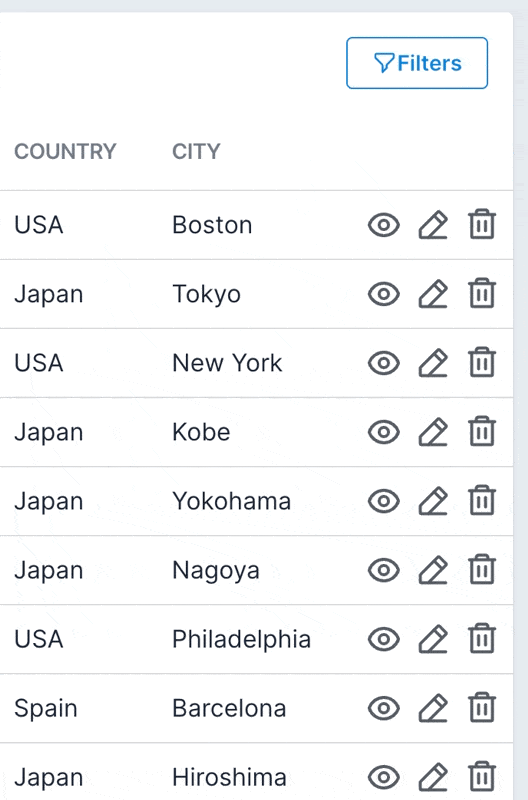
# app/avo/filters/course_city_filter.rb
class CourseCityFilter < Avo::Filters::BooleanFilter
self.name = "Course city filter"
self.empty_message = "Please select a country to view options."
def apply(request, query, values)
query.where(city: values.select { |city, selected| selected }.keys)
end
def options
if countries.present?
[]
else
["Los Angeles", "New York"]
end
end
private
def countries
# logic to fetch the countries
end
endKeep filters panel open
Watch the demo videoThere are scenarios where you wouldn't want to close the filters panel when you change the values. For that, you can use the keep_filters_panel_open resource option.
class CourseResource < Avo::BaseResource
self.keep_filters_panel_open = true
field :id, as: :id
field :name, as: :text
field :country, as: :select, options: Course.countries.map { |country| [country, country] }.to_h
field :city, as: :select, options: Course.cities.values.flatten.map { |country| [country, country] }.to_h
field :links, as: :has_many, searchable: true, placeholder: "Click to choose a link"
filter CourseCountryFilter
filter CourseCityFilter
end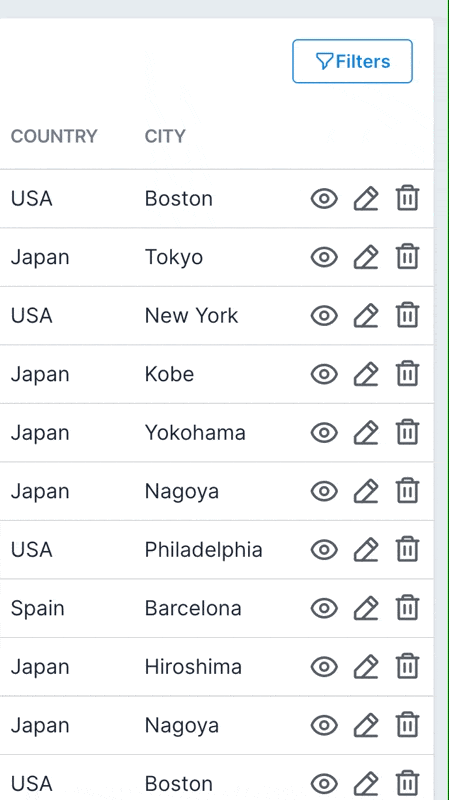
Visibility
You may want to manipulate your filter visibility on screens. You can do that using the self.visible attribute.
Inside the visible block you can acces the following variables:
self.visible = -> do
# You have access to:
# block
# context
# current_user
# params
# parent_model
# parent_resource
# resource
# view
# view_context
endFilters arguments
Filters can have different behaviors according to their host resource. In order to achieve that, arguments must be passed like on the example below:
class FishResource < Avo::BaseResource
self.title = :name
field :id, as: :id
field :name, as: :text
field :user, as: :belongs_to
field :type, as: :text, hide_on: :forms
filter NameFilter, arguments: {
case_insensitive: true
}
endNow, the arguments can be accessed inside NameFilter apply method and on the visible block!
class NameFilter < Avo::Filters::TextFilter
self.name = "Name filter"
self.button_label = "Filter by name"
self.visible = -> do
arguments[:case_insensitive]
end
def apply(request, query, value)
if arguments[:case_insensitive]
query.where("LOWER(name) LIKE ?", "%#{value.downcase}%")
else
query.where("name LIKE ?", "%#{value}%")
end
end
endManually create encoded URLs
You may want to redirect users to filtered states of the Index view from other places in your app. In order to create those filtered states you may use these helpers functions or Rails helpers.
Rails helpers
-> decode_filter_params
Decodes the filters param. This Rails helper can be used anywhere in a view or off the view_context.
Usage
# in a view
decode_filter_params params[:filters] # {"NameFilter"=>"Apple"}
# Or somewhere in an Avo configuration file
class DummyAction < Avo::BaseAction
self.name = "Dummy action"
def handle(**args)
filters = view_context.decode_filter_params(params[:filters])
do_something_important_with_the_filters filters
end
end-> encode_filter_params
Encodes a filters object into a serialized state that Avo understands. This Rails helper can be used anywhere in a view or off the view_context.
Usage
# in a view
filters = {"NameFilter"=>"Apple"}
encode_filter_params filters # eyJOYW1lRmlsdGVyIjoiQXBwbGUifQ==
# Or somewhere in an Avo configuration file
class DummyAction < Avo::BaseAction
self.name = "Dummy action"
def handle(**args)
do_something_important
redirect_to avo.resources_users_path(filters: view_context.decode_filter_params({"NameFilter"=>"Apple"}))
end
endStandalone helpers
-> Avo::Filters::BaseFilter.decode_filters
Decodes the filters param. This standalone method can be used anywhere.
Usage
class DummyAction < Avo::BaseAction
self.name = "Dummy action"
def handle(**args)
filters = Avo::Filters::BaseFilter.decode_filters(params[:filters])
do_something_important_with_the_filters filters
end
end-> Avo::Filters::BaseFilter.encode_filters
Encodes a filters object into a serialized state that Avo understands. This standalone method can be used anywhere.
Usage
class DummyAction < Avo::BaseAction
self.name = "Dummy action"
def handle(**args)
do_something_important
redirect_to avo.resources_users_path(filters: Avo::Filters::BaseFilter.encode_filters({"NameFilter"=>"Apple"}))
end
endPersistent filters
By default, when a user visits an Index view of a resource the filters payload will be empty, so they will be set on their default values.